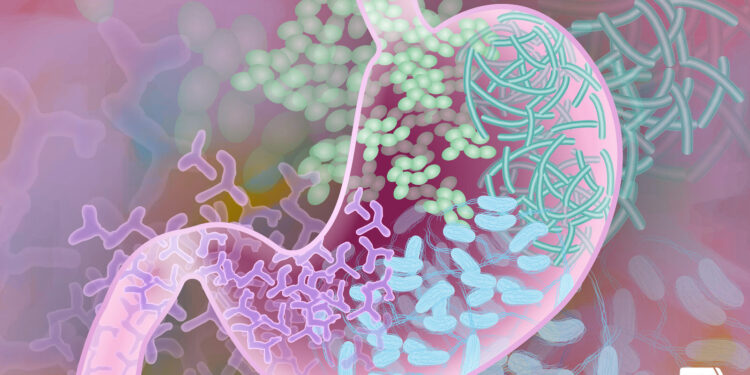Illustration of bacteria in the human intestine. Credit: Darryl Leja, National Human Genome Research Institute, National Institutes of Health
Researchers at the Francis Crick Institute have shown that the balance of bacteria in the gut can influence the symptoms of hypopituitarism in mice. They also showed that aspirin was able to improve the symptoms of hormone deficiency in mice with this disease.
People with mutations in a gene called Sox3 develop hypopituitarism, where the pituitary gland does not produce enough hormones. This can lead to growth problems, infertility, and the body’s poor response to stress.
In research published today in PLOS GeneticsCrick scientists removed Sox3 from mice, causing them to develop hypopituitarism upon weaning (starting to eat solid foods).
They found that Sox3 mutations largely affect the brain’s hypothalamus, which tells the pituitary gland to release hormones. However, the gene is normally active in several types of brain cells. The first task was therefore to determine which specific cells were most affected by its absence.
The scientists observed a reduced number of cells called NG2 glials, suggesting that they play a critical role in the maturation of pituitary cells during weaning, which was not previously known. This could explain the associated impact on hormone production.
The team then treated the mice with a low dose of aspirin for 21 days. This caused an increase in the number of NG2 glial cells in the hypothalamus and reversed the symptoms of hypopituitarism in mice.
Although it is not yet clear how aspirin had this effect, the results suggest that it could be explored as a potential treatment for people with Sox3 mutations or other situations in which NG2 glial cells are compromised.
Accidental discovery revealed role of gut bacteria in hormone production
When the National Institute of Medical Research (NIMR) merged with the Crick in 2015, mouse embryos were transferred from the first building to the second, including mice with Sox3 mutations.
When these mice reached the Crick weaning stage, the researchers were surprised to find that they no longer presented the expected hormonal deficits.
After exploring a number of possible causes, lead author Christophe Galichet compared the microbiome – bacteria, fungi and viruses that live in the gut – in the Crick mice and the NIMR mice, observing several differences in its composition. and its diversity. This could be due to the change in diet, aquatic environment or other factors that accompanied the relocation.
He also looked at the number of NG2 glial cells in the Crick mice, finding that these were also at normal levels, suggesting that the Crick-nurtured microbiome was somehow protective against hypopituitarism.
To confirm this theory, Christophe transplanted retained feces from NIMR mice into Crick mice, observing that the Crick mice again exhibited symptoms of hypopituitarism and had lower numbers of NG2 glial cells.
Although the exact mechanism is unknown, scientists conclude that the composition of the gut microbiome is an example of an important environmental factor having a significant influence on the consequences of a genetic mutation, in this case influencing the functioning of the hypothalamus and of the pituitary gland. gland.
Christophe Galichet, former senior research scientist at the Crick and now head of research operations at the Sainsbury Wellcome Centre, said: “It was a huge surprise to find that changes in the gut microbiome reversed hypopituitarism in mice lacking Sox3. This comforted me. how important it is to be aware of all variable factors, including the microbiome, when working with animals in research and how nurture can influence nature.
Robin Lovell-Badge, group leader of the Stem Cell Biology and Developmental Genetics Laboratory at Crick, said: “Hypopituitarism can result from trauma as well as rare mutations, and it can have profound effects on health in general. potential treatment options, our work reinforces the importance of the gut-brain connection.
“The next step in this research will be to determine exactly how aspirin and the microbiome influence NG2 glia, and then study this effect in humans so we can see if these relatively accessible interventions could help treat hypopituitarism. “
More information:
Galichet, C. et al. Sox3 null hypopituitarism is dependent on the NG2-glial median eminence and is influenced by aspirin and the gut microbiota. PLoS Genetics (2024). DOI: 10.1371/journal.pgen.1011395
Provided by the Francis Crick Institute
Quote: Gut microbiome may influence hormone levels, mouse study finds (September 26, 2024) retrieved September 26, 2024 from
This document is subject to copyright. Except for fair use for private study or research purposes, no part may be reproduced without written permission. The content is provided for informational purposes only.



